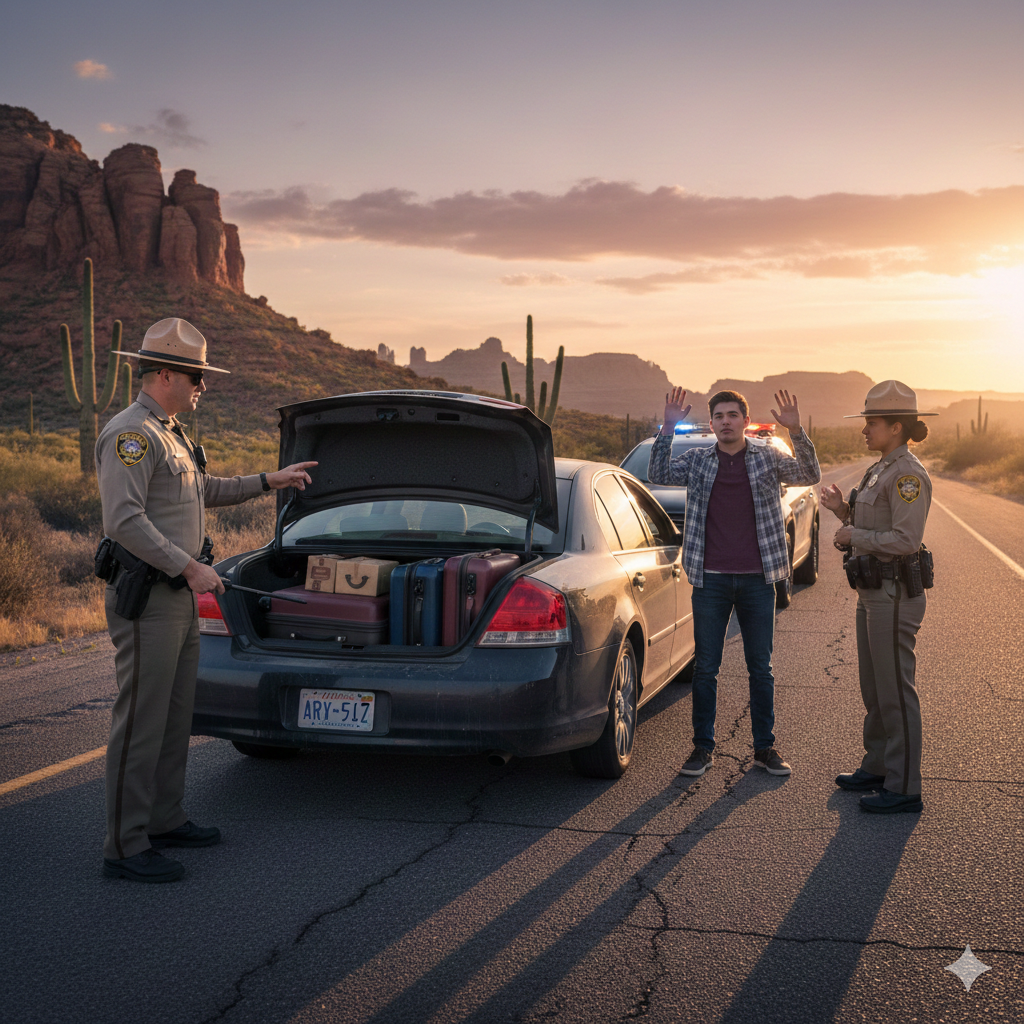Practice Areas
Testimonials
Your Rights During a Police Stop in Arizona
Why knowing your rights matters
Being stopped by the police can be stressful, whether you are walking, driving, or simply in the wrong place at the wrong time. In Arizona, understanding your rights is the best way to stay calm, protect yourself, and avoid making the situation worse.
You have legal protections under both state and federal law. These include the right to remain silent, the right to refuse certain searches, and the right to an attorney if you are detained or arrested. Exercising these rights respectfully can make a major difference in how a stop unfolds – and in what happens afterward.
Your Basic Rights During a Police Stop
Even if you have done nothing wrong, you have clear rights when stopped by law enforcement:
- You have the right to remain silent. You do not have to answer questions about where you are going, what you are doing, or anything else beyond providing basic identification details.
- You have the right to refuse a search. Unless the officer has a warrant or probable cause, you do not have to consent to a search of your car, bag, or person.
- You can ask if you are free to leave. If the officer says yes, you may calmly walk or drive away. If they say no, you are being detained – and it’s time to remain silent and ask for a lawyer.
- You have the right to an attorney. If you are arrested or questioned about a crime, you can request legal representation before answering anything further.
Always stay polite and calm. Arguing, raising your voice, or acting aggressively can escalate the situation, even if you’re legally in the right.
When You Must Identify Yourself in Arizona
Arizona has what’s known as a “stop and identify” law. This means:
- If a police officer reasonably suspects you are involved in a crime, you must state your true name when asked.
- If you are driving, you must show your driver’s licence, registration, and proof of insurance.
- If you are a passenger, you do not have to identify yourself unless the officer has specific suspicion that you committed a crime.
Failing to provide your true name when legally required can lead to an arrest.
Vehicle Searches: What Police Can and Cannot Do
Police officers often ask to search vehicles during traffic stops. Knowing when you can say no is essential.
In Arizona:
- Officers cannot search your car without your consent, a warrant, or probable cause.
- Probable cause includes situations where the officer sees illegal items in plain view or smells something illegal, such as marijuana.
- If you do not consent, say clearly: “I do not consent to a search.” This preserves your rights, even if the officer decides to search anyway.
- Never physically block or interfere with the search. Simply state your objection and remain silent.
If your car is searched without valid reason, your attorney can later challenge the evidence in court.
If You Are Detained or Arrested
Being detained means you are not free to leave, but you are not yet under arrest. You should still exercise your rights carefully.
If you are detained:
- Stay calm and avoid sudden movements.
- You can ask, “Am I being detained or am I free to go?”
- If detained, you have the right to remain silent and should not answer further questions without a lawyer present.
If you are arrested:
- You have the right to remain silent – use it. Anything you say can be used against you later.
- You have the right to speak with an attorney before answering any questions.
- You do not have to consent to a search of your phone or home without a warrant.
- You should not resist arrest physically, even if you believe it is unjustified.
Remaining calm, polite, and quiet is often the best protection for your case. The less you say at the scene, the more options your lawyer has later.
Common Mistakes to Avoid During a Police Stop
Many people accidentally make their situation worse during an encounter with police. These are common mistakes to avoid:
- Arguing or raising your voice. You can assert your rights without being confrontational.
- Lying to an officer. It is always better to remain silent than to give false information.
- Failing to inform about a weapon in the vehicle. If a police officer asks you whether you have any weapons on you or in your vehicle, you must answer this question truthfully for officer safety. Failure to answer this question at all or failure to answer it truthfully can lead to an arrest for misconduct involving weapons under A.R.S. §13-3102(A)(1)(b).
- Consenting to a search because you feel pressured. Officers may make it sound routine, but you are within your rights to say no.
- Resisting physically. Even if a stop feels unfair, resisting can lead to additional charges.
- Recording incorrectly. You are legally allowed to record police in public in Arizona as long as you do not interfere or get too close.
How an Attorney Can Help Protect Your Rights
If your rights are violated during a police stop, the outcome of your case may depend on having the right lawyer. An experienced criminal defence attorney can:
- Review whether the officer had legal grounds for the stop or search.
- Challenge evidence obtained illegally.
- Protect you from self-incrimination or procedural mistakes.
- Represent you in negotiations or court proceedings.
At Doran Justice, we help clients across Arizona understand their rights, fight unfair charges, and protect their record and reputation. If you believe you were stopped or searched unlawfully, we can help you take the next step.
FAQs
Do I have to answer questions about where I’m going or what I’m doing?
No. You only need to provide identification if legally required. Beyond that, you can say, “I’m choosing to remain silent.”
Do I have to get out of my vehicle if asked to do so?
The first thing you should do is ask if the officer is asking if you will get out of your vehicle or if they are ordering you to get out of your vehicle. If they are ordering you to get out, the best thing to do is comply. Pursuant to A.R.S. §28-622, wilfully failing to comply with a lawful order by a police officer is grounds for an arrest and is a class 2 misdemeanor. Yes, the order must be “lawful” but let your lawyer make that argument later rather than arguing with a police officer about it during the stop.
If I have the right to remain silent, do I still have to answer whether or not I have a weapon in the car?
Yes. Though you have the right to remain silent, there are some things you still must answer to avoid arrest or charges and under A.R.S. §13-3102(A)(1)(b) if you fail to accurately answer when they ask you if you have any weapons on you or near you, you could be arrested for that.
Can I record the police during a stop?
Yes, as long as you do not interfere with their duties. Keep a safe distance and avoid obstructing the scene.
What happens if I refuse a vehicle search?
The officer may still search if they have probable cause or a warrant, but your refusal can later support your legal defence.
What should I do if I believe my rights were violated?
Write down everything you remember, including names, badge numbers, and times. Contact a criminal defence lawyer as soon as possible.
Speak to an Arizona Criminal Defence Lawyer
If you’ve been stopped, searched, or arrested in Arizona, it’s important to act quickly. The sooner you speak to a lawyer, the more likely it is your rights can be protected.
Doran Justice provides experienced legal representation for criminal defence cases across Arizona. Contact our office today for a confidential consultation and protect your future.












